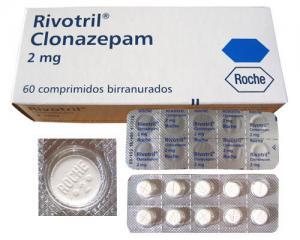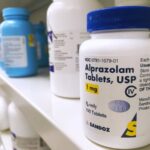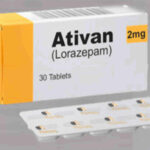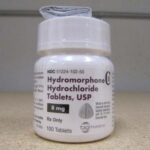Clonazepam: Uses, Side Effects, Addiction

Clonazepam, sold under the brand Klonopin among others, is a medication used to prevent and treat seizures, panic disorder, anxiety, and the movement disorder known as akathisia. It is a tranquilizer of the benzodiazepine class. It is taken by mouth. Effects begin within one hour and last between six and twelve hours. Clonazepam is used alone or in combination with other medications.
Clonazepam is a DEA Schedule IV controlled substance. Substances in the DEA Schedule IV have a low potential for abuse relative to substances in Schedule III
How should clonazepam be used?
Clonazepam comes as a tablet and an orally disintegrating tablet (tablet that dissolves quickly in the mouth) to take by mouth. It usually is taken one to three times a day with or without food. Take clonazepam at around the same time(s) every day. Follow the directions on your prescription label carefully, and ask your doctor or pharmacist to explain any part you do not understand.
Do not try to push the orally disintegrating tablet through the foil. Instead, use dry hands to peel back the foil packaging. Immediately take out the tablet and place it in your mouth. The tablet will quickly dissolve and can be swallowed with or without liquid.
Your doctor will probably start you on a low dose of clonazepam and gradually increase your dose, not more often than once every 3 days.
Clonazepam may help control your condition, but will not cure it. It may take a few weeks or longer before you feel the full benefit of clonazepam. Continue to take clonazepam even if you feel well. Do not stop taking clonazepam without talking to your doctor, even if you experience side effects such as unusual changes in behavior or mood, If you suddenly stop taking clonazepam, you may experience withdrawal symptoms such as new or worsening seizures, hallucinating (seeing things or hearing voices that do not exist), changes in behavior, sweating, uncontrollable shaking of a part of your body, stomach or muscle cramps, anxiety, or difficulty falling asleep or staying asleep. Your doctor will probably decrease your dose gradually.
Other uses for this medicine
Clonazepam is also used to treat symptoms of akathisia (restlessness and a need for constant movement) that may occur as a side effect of treatment with antipsychotic medications (medications for mental illness) and to treat acute catatonic reactions (state in which a person does not move or speak at all or moves or speaks abnormally). Talk to your doctor about the possible risks of using this medication for your condition.
This medication is sometimes prescribed for other uses; ask your doctor or pharmacist for more information.
What side effects can this medication cause?
Clonazepam may cause side effects. Tell your doctor if any of these symptoms are severe or do not go away:
- drowsiness
- dizziness
- unsteadiness
- problems with coordination
- difficulty thinking or remembering
- increased saliva
- muscle or joint pain
- frequent urination
- blurred vision
- changes in sex drive or ability
Some side effects can be serious. If you experience any of these symptoms call your doctor immediately or get emergency medical treatment:
- rash
- hives
- swelling of the eyes, face, lips, tongue, or throat
- difficulty breathing or swallowing
- hoarseness
- difficulty breathing
Clonazepam Safety Information
Clonazepam may increase the risk of serious or life-threatening breathing problems, sedation, or coma if used along with certain medications. Tell your doctor if you are taking or plan to take certain opiate medications for cough such as codeine (in Triacin-C, in Tuzistra XR) or hydrocodone (in Anexsia, in Norco, in Zyfrel) or for pain such as codeine (in Fiorinal), fentanyl (Actiq, Duragesic, Subsys, others), hydromorphone (Dilaudid, Exalgo), meperidine (Demerol), methadone (Dolophine, Methadose), morphine (Astramorph, Duramorph PF, Kadian), oxycodone (in Oxycet, in Percocet, in Roxicet, others), and tramadol (Conzip, Ultram, in Ultracet). Your doctor may need to change the dosages of your medications and will monitor you carefully. If you take clonazepam with any of these medications and you develop any of the following symptoms, call your doctor immediately or seek emergency medical care immediately: unusual dizziness, lightheadedness, extreme sleepiness, slowed or difficult breathing, or unresponsiveness. Be sure that your caregiver or family members know which symptoms may be serious so they can call the doctor or emergency medical care if you are unable to seek treatment on your own.
Clonazepam may be habit forming. Do not take a larger dose, take it more often, or for a longer time than your doctor tells you to. Tell your doctor if you have ever drunk large amounts of alcohol, if you use or have ever used street drugs, or have overused prescription medications. Do not drink alcohol or use street drugs during your treatment. Drinking alcohol or using street drugs during your treatment with clonazepam also increases the risk that you will experience these serious, life-threatening side effects. Also tell your doctor if you have or have ever had depression or another mental illness.
Clonazepam may cause a physical dependence (a condition in which unpleasant physical symptoms occur if a medication is suddenly stopped or taken in smaller doses), especially if you take it for several days to several weeks. Do not stop taking this medication or take fewer doses without talking to your doctor. Stopping clonazepam suddenly can worsen your condition and cause withdrawal symptoms that may last for several weeks to more than 12 months. Your doctor probably will decrease your clonazepam dose gradually. Call your doctor or get emergency medical treatment if you experience any of the following symptoms: unusual movements; ringing in your ears; anxiety; memory problems; difficulty concentrating; sleep problems; seizures; shaking; muscle twitching; changes in mental health; depression; burning or prickling feeling in your hands, arms, legs or feet; seeing or hearing things that others do not see or hear; thoughts of harming or killing yourself or others; overexcitement; or losing touch with reality.




